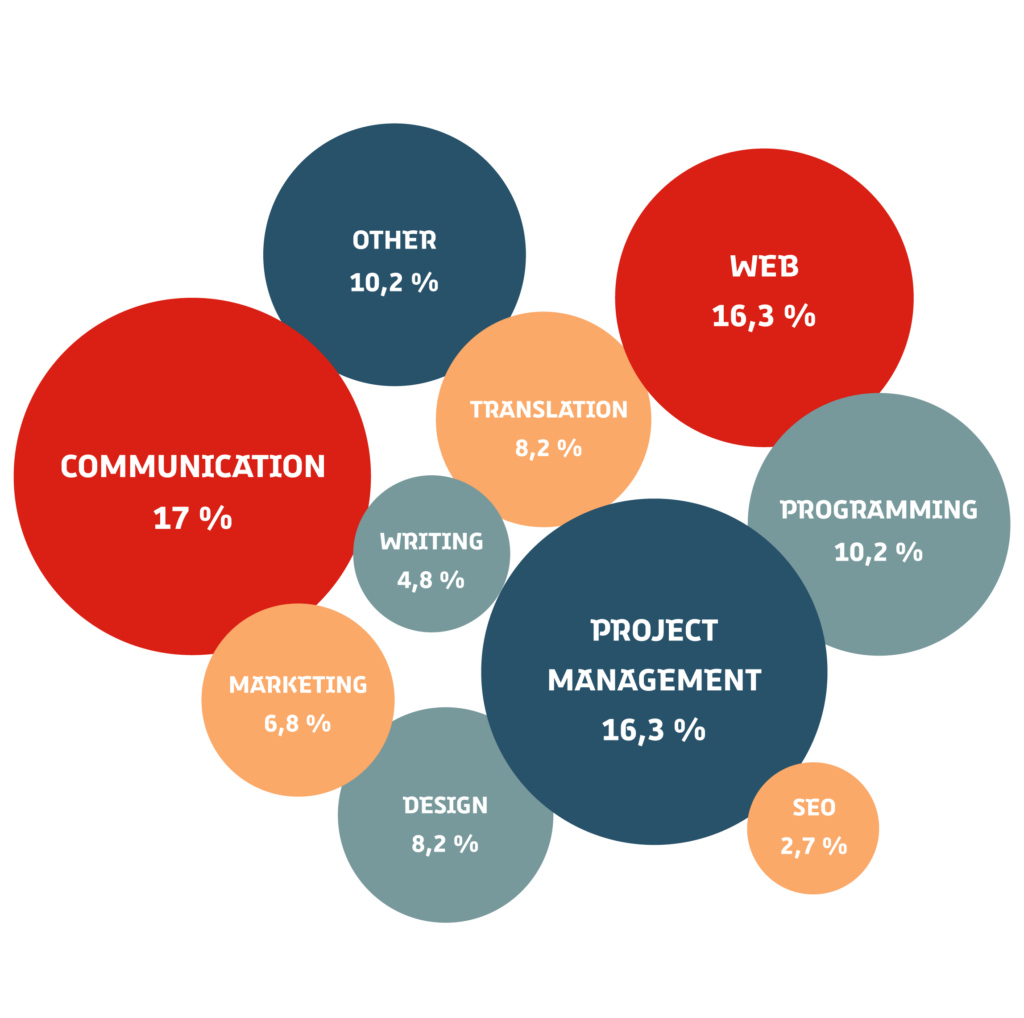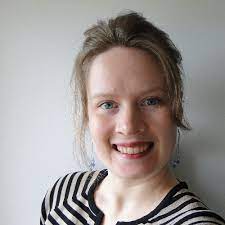Take Your Career Opportunities to the Next Level
CAWEB is designed to prepare you for a multidisciplinary career within the field of multilingual web communication. Through the combination of lectures, seminars, hands-on projects, and an optional work-study apprenticeship, you will gain a broad set of skills and have a wide variety of career opportunities available to you upon graduating. We’re proud to say that the rate of employment after completing our program remains high among CAWEB graduates.
Wondering what careers await you after graduation? Take a look at some of the fields that will be open to you after receiving your degree:
- Digital Marketing
- Project Management
- Localization
- Visual Communication
- Digital Marketing
- Web Development
What our graduates do

Where our graduates work

Project Management
Project Manager
Tasks:
A project manager supervises the team in charge of a project – for example creating a website They manage the relationship with the customer and work to analyze their needs. They also assess the feasibility of a project and develop the timeline and budget to execute it. Finally, they coordinate the work of the provider and internal and external resources, to successfully deliver the project on time.
Skills:
They are skilled at evaluating the stakes of each project, managing conflicts, and possessing the necessary skills to effectively manage the timeline, the resources and budget of a project. They have a good all-round view of many web technologies and skillsets.
Qualities:
They are diligent, organized, autonomous, versatile, and have strong analytical skills.
Webmaster
Tasks:
A webmaster is responsible for designing the website, updating it, and managing its content.
Skills:
They must master the different web languages used by the website(s) for which they are responsible (HTML, CSS, JavaScript, MySQL…). They must also master computer-aided production softwares (Photoshop, Illustrator…).
Qualities:
They must also have strong project management and organization skills.
Web Consultant
Tasks:
Web consultants provide advice and solutions to companies or clients in their field of expertise (ergonomics, SEO, responsive design…). They help to analyze the client’s needs and train them to use a specific tool or software for their website.
Skills:
They are specialists in their field of expertise. They know how to manage projects, understand the environment and the business surrounding the web. They also have good marketing and communication skills.
Qualities:
They possess a vast knowledge of building good relationships with their clients, ranging from listening to their problems, resolving them, and to managing conflicts.
Web Tester
Tasks:
Web tester’s main task, as the name suggests, is to test a website or a multimedia product before it is used by the public. They will then have to list all the malfunctions and monitor the progress of the modifications.
Skills:
They have good command of web programming languages and excellent problem-solving and analytical skills.
Qualities:
To become a web tester, you need to be diligent, organized, and diplomatic in nature.
Digital Marketing
SEO Expert
Tasks:
SEO experts optimize how a website runs, such as the structure of each of its pages, in order to improve ranking on search engine results pages (SERPs).
Skills:
They work with many web analytics tools. They also have to study the architecture of a website in depth, and thus must know computer languages and codes (HTML, CSS, PHP…). Good writing skills are also highly appreciated.
Qualities:
They are curious, organized, pragmatic, and diligent.
Community Manager
Tasks:
Community managers create and manage content for social media accounts. They usually have numerous tools at their disposal to manage the content and to measure engagement.
Skills:
Social media is no secret to a community manager. They are familiar with monitoring tools and statistical analysis.
Qualities:
They are able to manage stressful situations and conflicts, such as complaints or bad buzz. They must be able to adapt to new IT tools. A community manager is also versatile and can adapt the way in which they communicate to a target audience…
E-Marketing Manager
Tasks:
E-Marketing managers participate in the development, design and online launch of the site, and then take care of keeping it active. They set up a marketing strategy and partnerships with other companies/websites.
Skills:
They possess solid knowledge of marketing tools, web programming languages, data analysis tools, and written communication.
Qualities:
They are creative and innovative and demonstrate a strong sense of analysis and teamwork.
Web Content Writer
Tasks:
Web content writers are responsible for writing the content of a website or an application and laying it out in a CMS. When writing the content, they must also think about SEO and optimize the text as much as possible for search engines.
Skills:
Excellent writing skills are essential. They must have spelling and grammar in their working languages perfectly mastered. He or she must also be familiar with and proficient in HTML and CSS (at a minimum) and content management systems, such as WordPress.
Qualities:
The ability to summarize and organize content are qualities that are mostly sought after in web writing. Curiosity and creativity are equally important for this position.
Visual Communication
Graphic Designer
Tasks:
Graphic designer’s main task is to create a company’s visual identity and to find visual communication solutions.
Skills:
They should have a perfect command of computer-aided production (CAD) software, such as Photoshop, Illustrator, and InDesign. They must also be able to work quickly to meet short deadlines.
Qualities:
They must have a strong sense of creativity and imagination as well as being diligent and independent workers.
Web Designer
Tasks:
Web designers are in charge of developing the visual identity of a company or a website. They are also involved in creating the visual image of a company and graphic components for the website.
Skills:
An extensive knowledge of design software and web programming languages, particularly for front-end web development, is needed for this job.
Qualities:
Having an artistic flair is obviously essential to be a web designer. It is also necessary to be diligent, independent workers, and creative.
UX Designer
Tasks:
The primary goal of UX designers is to design a system that improves the user experience and satisfaction when using web and mobile applications. They take into account the goals of their clients and match them to users’ needs. They create wireframes for a product’s interface that allow to structure the information on a web page and define the ergonomics of the product.
Skills:
They are skilled in marketing, information architecture, and digital communication development.
Qualities:
They demonstrate a good sense of analysis, observation, creativity, and written communication.
Programming
Front-End Developer
Tasks:
Front-End Developers translate a graphic design into computer code. They perform cross browser compatibility testing and check compliance with W3C standards. They also integrate content (texts, images, etc.) into a website. Their main goal is to fully understand customers’ needs in order to best define the functionalities for a website.
Skills:
They are proficient in HTML/CSS, JavaScript and Ajax. They have a good grasp of several content management systems (CMS), code editors, W3C standards and image and animation editing applications. They are also familiar with the principles of ergonomics, accessibility, and SEO.
Qualities:
Front-End Developers are autonomous, versatile, diligent, and have the ability to work in a team.
Back-End Developer
Tasks:
Back-end developers are responsible for setting up, configuring, developing and maintaining the server, database and web application. Throughout the web development project, they work closely with the front-end developer.
Skills:
They have broad knowledge or programming and database languages, such as PHP, Ruby, Python, and SQL as well as in working with frameworks like Cake PHP, Symfony, Laravel, and Code Igniter.
Qualities:
They are organized, diligent, and self-motivated learners.
Full-Stack Developer
Tasks:
Full-stack developers ensure the programming of a website or application and are able to intervene at any time during the development process. They therefore have skills in many areas: UX/UI, back-end, front-end, etc. Their missions will vary and depend on the needs of the company for which they work. It also may be necessary to focus on a specific aspect or more global features when designing the site.
Skills:
Programming languages, graphic design tools, website integration and management, versatility, reactivity, creativity.
Qualities:
They demonstrate an excellent sense of creativity, versatility, and organization.
Localization
Translator/Localizer
Tasks:
Translator’s main missions are to translate content from a source language to a target language. They must also ensure that every translation is adapted to the target audience and localize it to a target culture.
Skills:
They must have a perfect command of their native language and a good knowledge of one or more foreign languages. They should also understand the different cultures of the languages into which he or she translates. They are familiar with CAT (Computer-Assisted Translation) tools such as SDL Trados Studio, MemoQ, XTM etc..
Qualities:
They must be able to work independently. If they are a freelancer, the translator must also maintain their reputation and network in order to be able to reach new clients.
Localization Engineer
Tasks:
Localization engineers translate from a source language into a target language. They adapt the content of a website, software, or other multimedia products to another culture, keeping in mind things like symbolism of images, colors, and other cultural factors.
Skills:
They must perfectly master their mother tongue and know one or more foreign languages. They must also know the target cultures and the necessary softwares. They also use softwares such as SDL Trados Studio, and KantanMT.
Qualities:
They must be able to work independently and have good analytical skills.
Video Game Localizer
Tasks:
Video game localizers are involved in the development of a game, and translates from a source language into one or more target languages. They adapt the game content (dialogues, instructions, etc.) as well as all marketing elements (trailers, press releases, advertising) to the target culture.
Skills:
They must perfectly master their mother language and be familiar with one or more foreign languages. The main quality required to do this job is to be able to adapt to a specific terminology and universe. They are sometimes required to translate with very little information about the context of the game. Being passionate about video games is also an advantage!
Qualities:
They must be able to work independently and creatively while adapting the game to the target culture.








